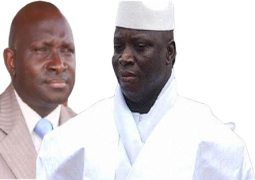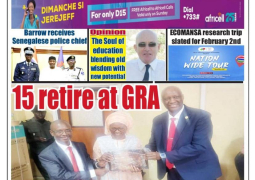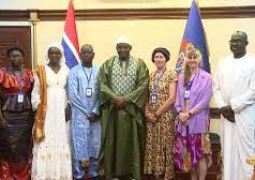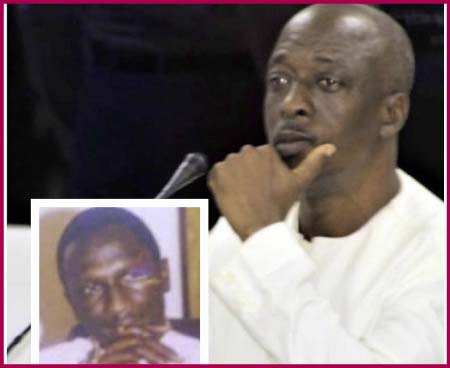
He stated that by a motion on notice dated and filed on the 15th June, 2020, Counsel Abdoulie Sissoho sought for the following orders from the court: An order granting leave to the defence witnesses namely, Mamie Minteh-Touray, Bakary Minteh and Mariama Minteh to give their oral testimonies in the case viz “remote hearing” pursuant to Direction Number 3 of 2020 (made pursuant to Section 143 of the Constitution of the Republic of The Gambia, 1997).
To also grant an order directing the judicial secretary to make the necessary arrangements with the IT Department of the judiciary to provide the necessary equipment and machinery for the hearing of the witnesses remotely. Such further or other orders as the court shall deem fit.
Justice Jaiteh further said that the motion on notice was supported by a 19-paragraph affidavit sworn to by one Muhammed Sissoho. He added that the respondent was served with the motion on notice and did not file an affidavit in opposition, but opposed the application on points of law.
At this juncture, he cited the case between the State and Abdoulie Conteh to support his ruling. “I hold the strong view that the failure to file an affidavit in opposition does not mean the party consented to the facts deposed to if the opposing party intends to oppose the application on grounds of law and this I shall hold as a fact. In our instant case, the respondent opposes the application on grounds of law and facts,” he told the court.
He said that in moving his motion paper, Counsel Sissoho brought his application pursuant to paragraphs 5 and 6 of Direction Number 3 of 2020. He stated that it was the submission of Counsel Sissoho that paragraph 9 of Direction 3 of 2020 gives the court the power to choose any of the cases to be heard on virtual hearing.
Counsel Sissoho, according to Justice Jaiteh, argued that some of the intended witnesses live in England and one of them lives in Dakar, Senegal, and because of travel expenses, WHO guidelines and mandatory quarantine for persons entering The Gambia, it would be time consuming and there is no certainty that the coronavirus would be over any time soon and the court could take judicial notice of the State of Emergency in The Gambia. He further said that Counsel Sissoho urged the court to grant the prayers sought on the motion paper in the interest of justice.
He again said that in responding on points of law, the state counsel, A.M. Yusuf, submitted that the application of this nature is at the discretion of the court, but cautioned that the discretion should be exercised within the ambits of the law. He adduced that Counsel Yusuf urged the court to take into cognizance Direction Number 3 of 2020, which allows the court to conduct remote hearing in certain cases and argued that paragraph 6 of Direction 3 of 2020 subjected itself to paragraph 9 of Direction 3 of 2020. He noted that it was the submission of the state counsel that the prayer sought was to allow witnesses for the defence to give oral testimonies in the case through remote hearing could not be said to be within the contemplation of paragraph 9 of Direction 3 of 2020.
Counsel Yusuf, said the presiding judge argued that the application offends the clear provision of Section 24 of the 1997 constitution of The Gambia, which mandated that all trials shall be held in public and the present case does not fall under the exceptions under Section 24 of the 1997 Constitution of The Gambia.
“It is the submission of Counsel Yusuf that Practice Direction and Regulation are made pursuant to the provision of a Statute and in the case of conflict, a Statute shall prevail and that Statute are made pursuant to a provision of the constitution and in any conflict between a Statute and the constitution, the constitution prevails,” he told the court.
He also said that Counsel Yusuf argued that a Practice Direction cannot override the provision of a Statute and thus urged the court not to grant the prayers sought on the motion on notice.
In replying on points of law, Justice Jaiteh adduced that Counsel Sissoho submitted that a Statute overrides a Practice Direction and a Regulation and argued that the court has the sole discretion as per paragraph 9 of Direction 3 of 2020. Counsel Sissoho further submitted that Section 24 of the constitution would not be infringed, as virtual hearing would be a public hearing.
The only issue, according to the presiding judge, was whether it was appropriate to hear the oral testimonies of Mamie Minteh-Touray, Bakary Minteh and Mariama Minteh vide remote hearing pursuant to Direction Number 3 of 2020.
“It is worthy to emphasise that emergency matters and non-emergency matters that are contemplated under Direction 3 of 2020 does not in my view include the offence of murder. In as much as Paragraph 7 of Direction 3 of 2020 gives the court the discretion to hear virtual court hearings, that discretion is limited to emergency matters and other appropriate matters as provided under paragraphs 8 and 9,” he clarified.
He posited that cross-examination is a right that can be equated with the right of fair hearing and limitation associated with video link cannot be overemphasized.
“From the foregoing reasons, I reach the conclusion that the oral testimonies of Mamie Minteh-Touray, Bakary Minteh and Mariama Minteh cannot be heard vide remote hearing. Accordingly, this application is hereby dismissed,” he declared.
Regarding the production of the coroner file docket by the judicial secretary as applied by the defence counsel, the Acting Master of the High Court, Sheriff Tabally, informed the court that the judicial secretary had informed him that a letter had been discharged to the effect that no records existed as subpoenaed.
At this juncture, Counsel Sissoho applied for the judicial secretary to appear in court for him to ask her some questions but the judicial secretary was in a meeting. The state counsel opposed the application and challenged the defence counsel.
“It is clear that there was no file docket in relation to Ousman Koro Ceesay’s death. The application is refused,” Justice Jaiteh ruled.
The matter was adjourned to the 28th July, 2020, for hearing.
Read Other Articles In Headlines
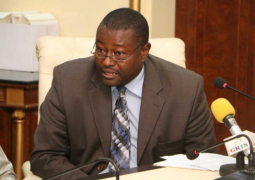
As Gambia grapples with caste system, NHRC urges gov’t to address situation
Aug 18, 2020, 12:46 PM
